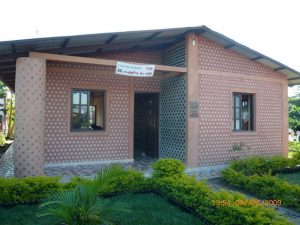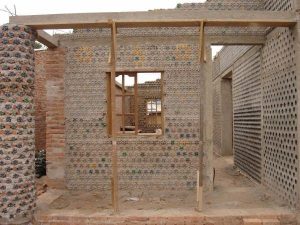Plastic and waste management has been a persistent problem in the heart of Africa. According to the United Nations, 4.4 million tons of waste camp around the oceans and seas. While a majority of African countries still dole out plastic bags in supermarkets, some African countries have taken the initiative to ban plastic bags entirely. These countries include Morocco, Rwanda and Kenya.
However, this does not handle the problem on the ground. Banning of the manufacturing on the plastic bags is just a tip of the iceberg, the bigger problem lays on the ground. Addressing plastic waste pollution requires holistic approaches focused on upstream activities.
One out of seven Africans is Nigerian. Nigeria has a population of 182 million people. The home of Nollywood annually generates 62 million tons of waste. If the trend continues the country is likely to spearhead in waste production by producing 161 million tons annually by 2025. However, the plastic housing initiative has already begun in this part of Africa in order to handle the plastic waste menace.

With the pounds of plastic laying around the oceans and landfills every year, they would seem like the last material one would use to build a house. Nevertheless, parts of Abuja, Nigeria have embraced this cheap and purposeful project that sees the waste that would have otherwise ended up in the streets and oceans, provide shelter, a basic need
How to construct plastic houses?

Bottles are purchased from the local waste collectors and the citizens in general. The bottles are used as bricks and interconnected with ropes to prevent cracks and offer long-lasting support to the building. This also adds the aestheticism and beauty. Mud mixture of sharp and laterite is used to fill the bottles, this serves as blocks to build the plastic houses.
Combined with sustainable home maintenance practices, plastic houses are likely to be the greenest homes in Nigeria.
Benefits of plastic houses.
Experts argue that building the houses consumes a third of what a concrete building or house would otherwise cost. This is because sand which makes up 75% of any concrete is gradually diminishing not only in Africa but around the world. An estimated 108million Nigerians are classified as homeless. Despite the construction of 100,000 new houses each year, a majority cannot afford as they tend to be expensive. These ‘modern plastic houses’ provide a solution as they are cheap and affordable.
In addition to the eco-friendly housing initiative providing a clean environment, plastic housing comes with the benefit of job creation opportunities to the youth – ranging from plastic waste collection activities to the actual construction. Youth unemployment in Nigeria is alarming. Unemployment reached an all-time high of 38 percent in the second quarter of 2018. The plastic housing is a major outlook for unemployed youths.
Solutions to the plastic menace have to be sustainable. Recycling is one of the ways to do this. Plastic houses serve as a solution that hits several aspects that aid in achieving sustainability if incorporated with other methods of recycling and reusing the plastic on the ground.



